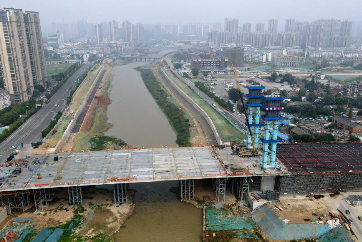-
17727404026


cross border logisticsIn the face of recent COVID-19 cases, traders and producers across the Yangtze River Delta, a major manufacturing and trade hub, have taken a watchful eye while maintaining normal operations, and local governments are seeking to minimize economic disruption while reining in the spread of the virus.
Just a month after the end of the lockdown in Shanghai, the center of the delta region, flare-ups have been reported in several cities across the region over the weekend. Xuzhou, East China's Jiangsu Province reported 13 new cases on Saturday and Wuxi, also in Jiangsu, reported 31 infections on Saturday.
While the epidemic situation lingers with newly reported cases, businesses have continued running smoothly, thanks to local governments' stepping-up efforts in securing supply chain while responding to the epidemic with rapid and precise prevention and control, the Global Times learned from several traders and producers in the region on Sunday.

Zhao Yong, a manager from Shanghai Shirui Supply Chain Management Co, with logistic business mainly based in the Yangtze-River Delta, told the Global Times that the current scattered outbreaks have had no particular impact on their business as epidemic control measures in the corresponding cities are targeted and take into account the needs of the local economy.
"We have cargo transportation business in cities such as Wuxi and so far, there is no impact since the restriction measures are limited to certain places in connection with reported cases while transportation between cities remains OK," he said, adding that the company has seen business pick up month by month and he expects more orders coming in July as production resumes and confidence rebounds.
To minimize unnecessary disruption to the economy and people's lives, local governments in the region and beyond are implementing the epidemic control measures while avoiding a one-size-fits-all approach, according to media reports.
For example, except for medium and high-risk areas in Xuzhou, people in the city can still move freely, and enterprises continue to operate normally, according to the Xuzhou government on Sunday.
An individual from Caterpillar Xuzhou confirmed with the Global Times on Sunday that the company's production remains undisrupted and the transportation in and out of the city appears unaffected, noting only that drivers need to provide a 48-hour nucleic acid test result before departure.
"We've not been affected by any of the latest outbreaks, and logistics remains normal," an auto parts producer in Nantong, East China's Jiangsu Province, also told the Global Times on Sunday.
But the producer noted that logistics to Shanghai are still 20 percent more expensive than the pre-epidemic period since according to local guidelines, truck drivers have to submit to quarantine if they've been to Shanghai. "Now we still have to pay extra money to a third-party logistics company to send products to Shanghai customers," the producer said.
In a press conference addressing epidemic control on Sunday, Shanghai announced one new high-risk area and a further two other medium-risk areas after a new local asymptomatic infection was reported and 99 close contacts were tracked.